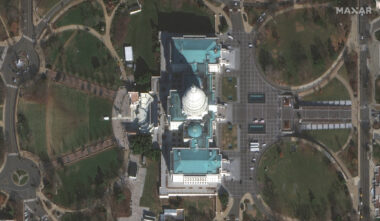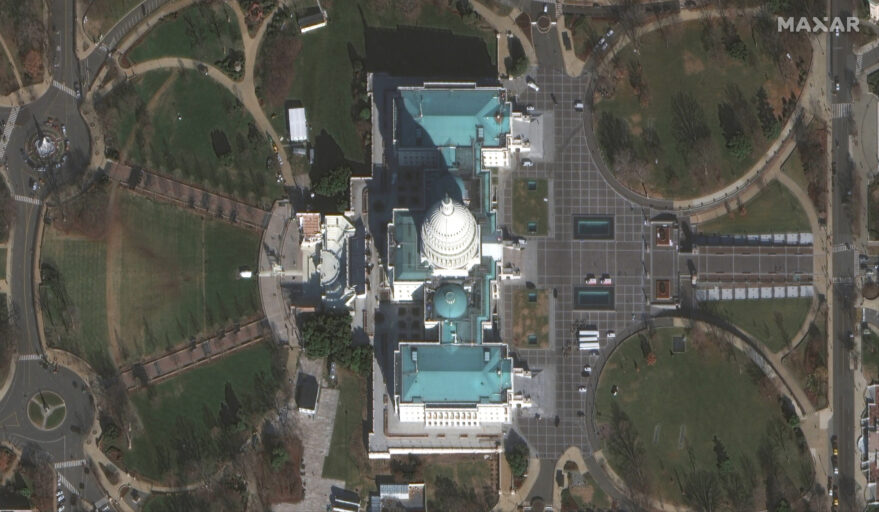The uncomfortable truth now facing the space community, in the days after the horrific events at the Capitol Jan. 6, is that some of the most prominent Republican supporters of space in Congress are on the wrong side of history.

One of the central tenets of space politics for decades is that the issue is bipartisan. Debates about NASA programs and funding levels are more likely to be along parochial than partisan lines. For example, when NASA decided in 2019 to place the new Human Landing System program office at the Marshall Space Flight Center, it won praise from Republican members of Alabama’s congressional delegation but was criticized by Republican members from Texas who thought the office should be based at the Johnson Space Center.
The space industry and other space advocates have long worked to cultivate support from both parties in Congress. Part of that is to provide stability as parties move in and out of power. It also reflects the fact that very few members of Congress care that much about space, because it is not a high-profile issue. The industry needs all the supporters it can get on Capitol Hill.
The uncomfortable truth now facing the space community, in the days after the horrific events at the Capitol Jan. 6, is that some of the most prominent Republican supporters of space in Congress are on the wrong side of history. In the days leading up to the formal, and usually only ceremonial, certification of the Electoral College results, members like Sen. Ted Cruz (R-Texas) and Reps. Brian Babin (R-Texas) and Mo Brooks (R-Ala.) announced their intent to challenge several states’ electors, citing baseless claims of voter fraud.
Those actions helped fuel a protest, which became a riot. Afterward, those members disavowed the violence, but were hardly repentant. When the Senate reconvened later that evening, Cruz continued his challenge of Arizona’s electors, and later backed a challenge of Pennsylvania’s electors.
Babin, in a statement Jan. 7, said he was “against what took place yesterday inside the Capitol building and the manner in which it occurred” — that is, the riot — but put the blame on the Supreme Court for rejecting a lawsuit challenging several states’ electors. Brooks claimed on Twitter that the rioters were “fascist ANTIFA” (an oxymoron: “Antifa” comes from the term “anti-fascist”), but ongoing law enforcement investigations have shown those who invaded the Capitol that day were staunch, but terribly misguided, supporters of President Trump.
In the coming weeks, Congress will move on from the inauguration of Joe Biden and the second impeachment trial of Donald Trump, and start to take up more mundane issues, like space. That may include another attempt at a NASA authorization bill. In December, the Senate passed a NASA authorization bill with bipartisan support that its lead sponsor hoped would serve as the basis for a similar bill that could pass Congress in early 2021. The problem is that lead sponsor: Ted Cruz.
Will Democrats in Congress be willing to support a similar bill if it’s reintroduced by Cruz? Should they? It’s not hard to imagine them taking a stand, refusing to cooperate with members that backed the protests, either by declining to co-sponsor legislation or opposing the bills entirely.
Will the space industry also take a stand? Initial signs are not encouraging. While dozens of companies announced they will halt donations to members who supported efforts to block electors, several major aerospace corporations, including Boeing, Lockheed Martin and Northrop Grumman, have said they’re suspending such donations entirely, affecting both members whose actions helped instigate the riot and those who were victims of it.
There are many Republican members of Congress who opposed the effort to block certification. These include powerful figures like Sens. Richard Shelby (R-Ala.) and Roger Wicker (R-Miss.), the top Republicans on the appropriations and commerce committees, respectively. If the space industry continues to seek bipartisan support — a noble goal, all else being equal — they’re a good place to start.
The danger is if the space community reverts to political expediency, willing to work with any member who shows an interest in space. No issue, including space, is that important.
This Foust Forward column was published in the Jan. 18 issue of SpaceNews magazine under the headline “With friends like these… “
